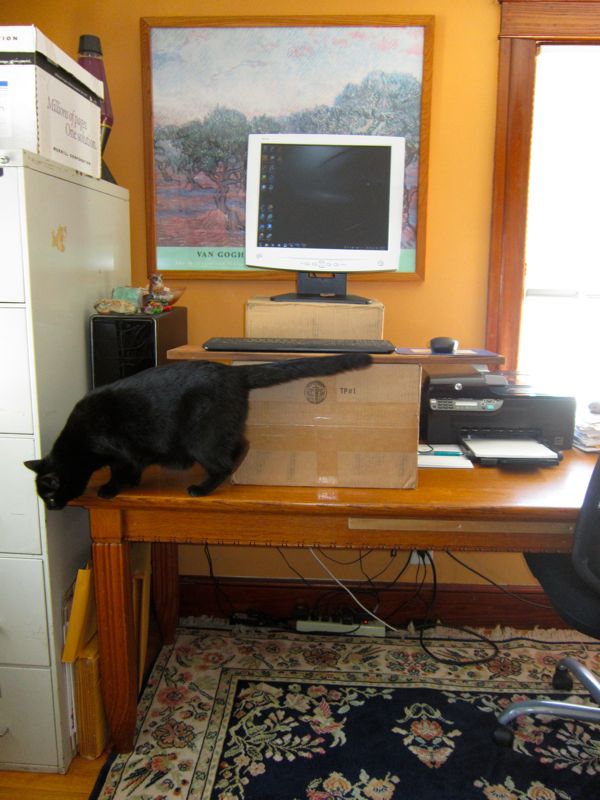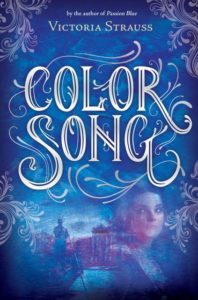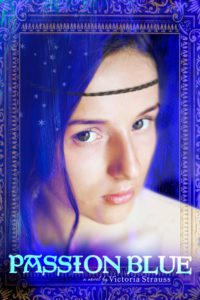I have a few physical issues—occasional back pain, carpal tunnel syndrome—but for me the biggest concern right now is too much sitting.
I keep up with health news, and there’s been quite a lot of discussion lately about the negative impact of being sedentary, even if you exercise regularly (which I do: walking, running, and/or strength training at least 5 days a week).
I recently set up my office so that I can stand at my computer—which works OK but if I do it all day, produces a whole other set of challenges, in the form of foot and knee pain.
I’m compromising by standing in the morning when I work on email and professional stuff, and sitting in the afternoon, when I work on my fiction.

I’m still trying to find the right balance. I really, really want to be less sedentary.
Standing is better for my overall health, but it’s doing no favor to my knees. I do have one of those cushy mats that reduces the stress of standing, and that helps, but I still pay the price if I stand up all day. I would love to get a treadmill desk, but space and budget won’t allow.
Only the Bad Reviews are True (and Other Terrors of Self-Doubt)
The emotional challenges have shifted over the years. Initially, before I was published, it was rejection. Then, after my first novel was published, it was the fear of not being able to write a better second novel.
Now, with all the changes in publishing, it’s all the extra work that surrounds the business of being an author, which I find extremely stressful. Once upon a time, an author’s only job was to write. No longer.
The constant, for me, is self-doubt. That’s always been a default emotional position for me, even as a child. It threatens to derail me by telling me I’m not good enough, that the positive developments in my career have been flukes, that good reviews can be dismissed but bad reviews are true, that even though I’ve written and been happy with X number of books, this one, the one I’m writing right now, is the one I won’t be able to finish, the one that will fail, the one that will be awful.
I’m constantly having to pick myself up and make myself go on.
And yet I’m grateful for self-doubt. Because the flip side is that, in causing me to question absolutely everything about my writing, self-doubt makes it impossible for me to become complacent, steers me away from compromises and easy choices, and, by never letting me settle, pushes me to do the absolute best I can do.
The challenge is holding the balance between the productive self-doubt that makes my writing better, and the destructive self-doubt that tells me I shouldn’t be writing at all. So far I’ve managed to hold on.
My main coping mechanism, when self-doubt wants to take over, is simply stepping away for a while. Going for a walk or to the gym. Doing some gardening. Watching a movie. Reading. Making some space to get my perspective back, and to remember why I do what I do.
I’m also lucky to have a super-supportive husband. When I’m freaking out, he reminds me that I’ve been there before and gotten through it. I don’t always believe him—but he’s always right.
When My Agent Told Me My Next Novel Was Unpublishable
After writing three YA novels, I decided I wanted to switch to the adult market. I researched and started writing a historical novel. I sent the first few chapters to my agent; she read them and we made an appointment to have lunch.
Of course I thought she was going to gush about how much she loved my chapters. Instead, she told me that the novel was unpublishable, and that if she’d gotten the chapters from someone she didn’t know, she would have had wondered whether that person had any future as a writer.
“You’ve written three very good novels,” she said. “That’s something you can be proud of.”
It was brutal. I went home and sat down on my bed and thought about what to do. It was clear to me that I was at a crossroads.
I could accept what my agent seemed to be telling me: that I should give up. Or I could go on writing anyway.
I could think of plenty of reasons to give up: no agent (she didn’t actually fire me, but that was how it seemed to me at the time), no talent, a dead project, no alternative ideas. I couldn’t think of a single reason to go on.
Even so, that’s what I chose. I just couldn’t conceive of a life in which I wasn’t a writer. I did write another book, and it did sell, and I was able to move into the adult market, just as I’d planned.
(I also—much later—realized that my agent was right about that historical novel. The premise was good, but I just didn’t have the skill to execute it at the time.)
The One Thing That Has Kept You True to Your Path
Writing is the only thing in the world where I cannot do less than my best. Everywhere else, I’m able to compromise—but not with writing.
With writing, I’m all-in, completely engaged, totally immersed, entirely truthful. That’s what keeps me going.
Advice for a Young Writer
I think that what’s hardest is different for everyone. You can’t know what it is at the outset; you have to work yourself some way into a writing career to discover it.
Self-doubt, rejection, isolation, self-promotion, professional envy, unsupportive spouses and families, the time the business of being a writer takes away from actual writing—any of these may become what a writer struggles with most, according to his or her own individual temperament.
I think it’s important to remember that all writers struggle—and that whatever it is you’re struggling with right now, there are others who are experiencing the same thing.
I think we’re all inclined to believe “it’s only me”, but that’s almost never true.
Whatever challenge you’re experiencing, you can be certain that others are going through it as well. Your family and friends may not understand, but other writers will.
* * *
Victoria Strauss is the author of nine novels for adults and young adults, including the Way of Arata fantasy series (The Burning Land and The Awakened City) and a pair of historical novels for teens, Passion Blue and Color Song. Her articles on writing have appeared in Writer’s Digest, among others.
An active member of the Science Fiction and Fantasy Writers of America, she’s co-founder, with Ann Crispin, of Writer Beware, a publishing industry watchdog group. In 2009, she received the Service to SFWA Award for her work with Writer Beware, and was honored with an Independent Book Blogger award in 2012.
For more information on Victoria and her work, please see her website and Writer Beware, or follow her on Twitter and Facebook.
 Color Song (book 2 of the Passion Blue duology): In late-15th century Italy, 18-year-old Giulia flees the convent where she has been confined against her will and escapes to Venice, where, disguised as a boy, she fights to fulfill her dream of becoming a painter.
Color Song (book 2 of the Passion Blue duology): In late-15th century Italy, 18-year-old Giulia flees the convent where she has been confined against her will and escapes to Venice, where, disguised as a boy, she fights to fulfill her dream of becoming a painter.
But Giulia carries dangerous secrets; and Venice, with its twisting canals and gilded palazzi, has secrets of its own.
Trapped in her false identity in this dream-like place where reality and reflection are easily confused, can Giulia find her way?
Available at Amazon, Barnes & Noble, and IndieBound.
 PassionBlue (book 1 of the Passion Blue duology): The scorned illegitimate daughter of a Milanese nobleman, Giulia is determined to claim what she believes is her heart’s desire: true love and a place where she belongs–not likely prospects for a girl about to be packed off to the cloistered world of a convent.
PassionBlue (book 1 of the Passion Blue duology): The scorned illegitimate daughter of a Milanese nobleman, Giulia is determined to claim what she believes is her heart’s desire: true love and a place where she belongs–not likely prospects for a girl about to be packed off to the cloistered world of a convent.
But the convent of Santa Marta is full of surprises. As Giulia begins to learn the mysteries of the painter’s craft, a forbidden romance beckons her down a path of uncertainty and danger.
She is haunted by a sorcerer’s warning, and by a question: does she really know the true compass of her heart?
Available at Amazon, Barnes & Noble, and IndieBound.


“Gone with the Wind” was rejected so many times, Margaret Mitchell gave up. The book would have never found a publisher if a friend if hers hadn’t borrowed the manuscript withhold asking and taken it to an editor she knew in New York.
And Mitchell was not alone:
After 5 years of continual rejection, the writer finally lands a publishing deal: Agatha Christie. Her book sales are now in excess of $2 billion. Only William Shakespeare has sold more.
Louis L’Amour received 200 rejections before Bantam took a chance on him. He is now their best ever selling author with 330 million sales.
http://www.literaryrejections.com/best-sellers-initially-rejected/
Thank you, Victoria! I never thought of self-doubt as being a force for good, but you’re right, it definitely can be! I’ll try to channel it in that direction- a drive to improve, not to quit.